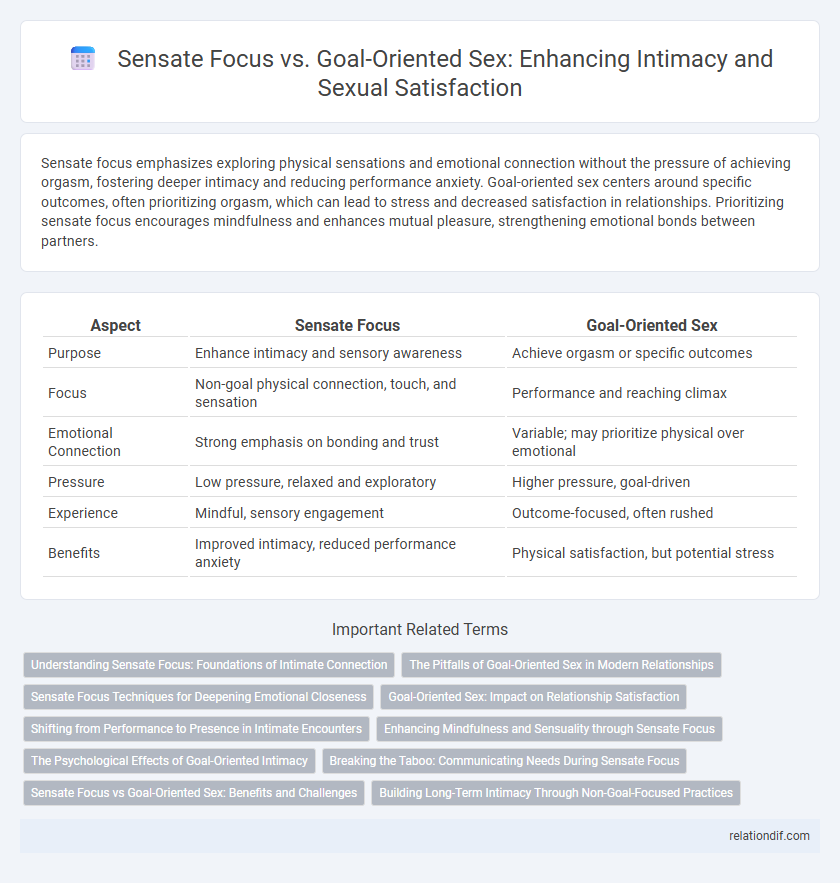Sensate focus emphasizes exploring physical sensations and emotional connection without the pressure of achieving orgasm, fostering deeper intimacy and reducing performance anxiety. Goal-oriented sex centers around specific outcomes, often prioritizing orgasm, which can lead to stress and decreased satisfaction in relationships. Prioritizing sensate focus encourages mindfulness and enhances mutual pleasure, strengthening emotional bonds between partners.
Table of Comparison
| Aspect | Sensate Focus | Goal-Oriented Sex |
|---|---|---|
| Purpose | Enhance intimacy and sensory awareness | Achieve orgasm or specific outcomes |
| Focus | Non-goal physical connection, touch, and sensation | Performance and reaching climax |
| Emotional Connection | Strong emphasis on bonding and trust | Variable; may prioritize physical over emotional |
| Pressure | Low pressure, relaxed and exploratory | Higher pressure, goal-driven |
| Experience | Mindful, sensory engagement | Outcome-focused, often rushed |
| Benefits | Improved intimacy, reduced performance anxiety | Physical satisfaction, but potential stress |
Understanding Sensate Focus: Foundations of Intimate Connection
Sensate focus emphasizes mindful touch and present-moment awareness, fostering deep emotional connection without pressure for performance or specific outcomes. This approach prioritizes sensory exploration and mutual attunement, shifting away from goal-oriented sex centered on orgasm or achievement. Understanding sensate focus builds foundational trust and intimacy, enhancing communication and increasing overall relationship satisfaction.
The Pitfalls of Goal-Oriented Sex in Modern Relationships
Goal-oriented sex often prioritizes orgasm as the main outcome, which can create performance pressure and reduce emotional connection between partners. This approach may lead to anxiety, decreased satisfaction, and disrupted communication, undermining intimacy in modern relationships. Sensate focus, by emphasizing present-moment sensations and mutual exploration, fosters deeper bonding and more fulfilling sexual experiences.
Sensate Focus Techniques for Deepening Emotional Closeness
Sensate focus techniques prioritize mindful touch and sensory awareness, fostering a deeper emotional connection by shifting attention away from performance and goals. This approach encourages partners to explore physical sensations without pressure, enhancing intimacy through presence and mutual attunement. Scientific studies highlight that sensate focus can reduce anxiety related to sexual performance, promoting emotional closeness and improving relationship satisfaction.
Goal-Oriented Sex: Impact on Relationship Satisfaction
Goal-oriented sex, centered on achieving specific outcomes like orgasm, often increases performance pressure and reduces spontaneous emotional connection between partners. Research indicates that this focus can diminish relationship satisfaction by prioritizing physical results over mutual intimacy and communication. Couples emphasizing goal-oriented sex may experience decreased emotional intimacy, highlighting the importance of shifting towards more mindful and present interactions for enhanced relationship quality.
Shifting from Performance to Presence in Intimate Encounters
Sensate focus emphasizes mindful touch and bodily sensations, shifting the attention from achieving specific outcomes to cultivating presence in intimate encounters. This approach reduces performance pressure by encouraging partners to explore and appreciate moment-to-moment experiences without the goal of orgasm or penetration. Prioritizing presence fosters deeper emotional connection and enhances overall sexual satisfaction through attuned, non-goal-driven interaction.
Enhancing Mindfulness and Sensuality through Sensate Focus
Sensate focus emphasizes mindfulness and sensuality by encouraging partners to explore touch and sensation without pressure for sexual goals, fostering deeper emotional connection and relaxation. This technique enhances awareness of bodily sensations and heightens intimacy through non-demanding, attentive physical contact. Unlike goal-oriented sex, sensate focus cultivates presence and reduces performance anxiety, leading to more fulfilling and spontaneous intimate experiences.
The Psychological Effects of Goal-Oriented Intimacy
Goal-oriented intimacy often leads to increased performance anxiety and diminished emotional connection between partners, as the emphasis shifts toward achieving specific outcomes rather than shared sensory experiences. This approach can create pressure that reduces natural spontaneity and hinders authentic communication during sexual encounters. In contrast, sensate focus encourages mindfulness and presence, fostering deeper psychological intimacy and mutual satisfaction.
Breaking the Taboo: Communicating Needs During Sensate Focus
Sensate focus emphasizes mindful, present-moment touch that fosters emotional connection, contrasting with goal-oriented sex's emphasis on performance and achieving orgasm. Breaking the taboo around communicating needs during sensate focus encourages partners to express desires and boundaries openly, enhancing trust and intimacy. Research shows that open dialogue during sensate focus sessions leads to increased satisfaction and reduced anxiety in sexual relationships.
Sensate Focus vs Goal-Oriented Sex: Benefits and Challenges
Sensate focus emphasizes mindful touch and sensory awareness, enhancing emotional connection and reducing performance pressure, which fosters intimacy and communication between partners. Goal-oriented sex prioritizes achieving orgasm or specific outcomes, potentially creating stress and limiting spontaneous pleasure. Sensate focus benefits include decreased anxiety and improved relational satisfaction, while goal-oriented sex may challenge emotional closeness but can provide structure for sexual experiences.
Building Long-Term Intimacy Through Non-Goal-Focused Practices
Sensate focus emphasizes mindful touch and present-moment awareness, fostering deep emotional connection without the pressure of performance or a specific outcome. This practice cultivates trust and vulnerability, essential components for building sustained intimacy in relationships. By prioritizing sensory experience over goal-oriented sex, partners create a foundation of mutual attunement that enhances long-term intimacy.
Sensate focus vs goal-oriented sex Infographic

 relationdif.com
relationdif.com